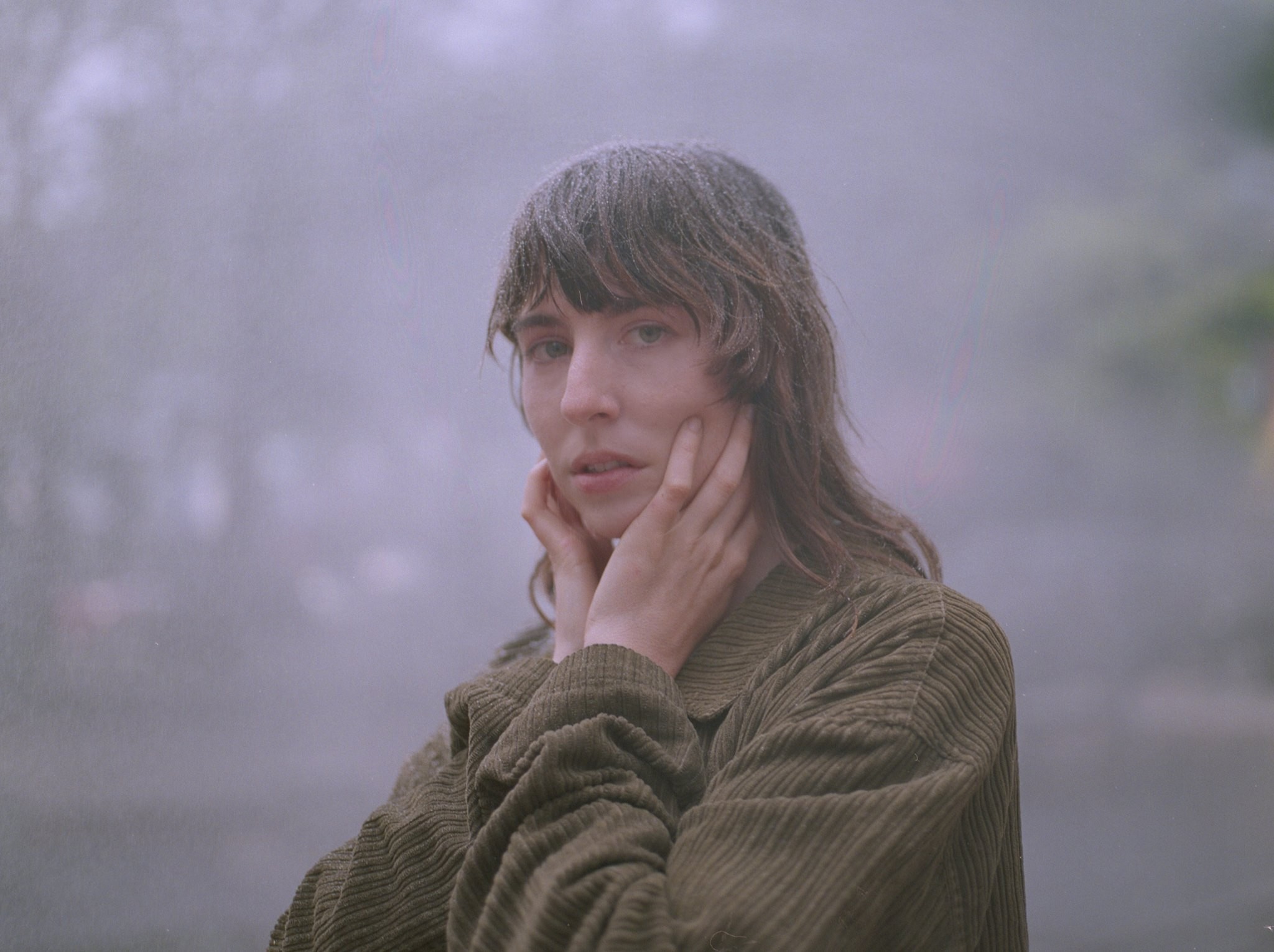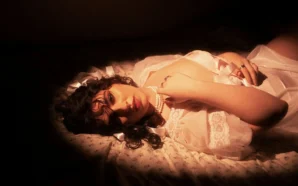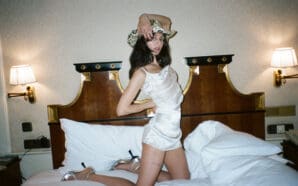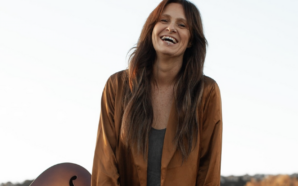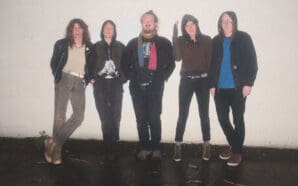This September experimental rockers Mothers released Render Another Ugly Method (ANTI-Records), their first official release since songwriter/guitarist/vocalist/main-person Kristine Leschper relocated to the City of Brotherly Love and Sisterly Affection. The album has received praise from the likes of BrooklynVegan, NPR, and Treble Zine, who declared it, “nearly an hour-long anxiety attack, more frantic and on-edge than any guitar-rock record of the year.” Mothers have been on the road for much of the year and will wrap up this current two-and-a-half-month trek with a hometown show at Johnny Brenda’s this Saturday, November 3rd. I recently got a chance to chat with Leschper, who told me about how she’s spent 2018, her current mindset, and the things that have been serving as her biggest influences recently.
Izzy Cihak: You’ve been on the road for a decent chunk of this year. What have been some of the highlights of these dates so far? You’ve played some really big shows.
Kristine Leschper: I did a solo tour with Lucy Dacus in July – that experience stands out because it was a reminder that tour can be healing and transformative when you focus on people/relationships over the stressors of being on the road. I have a complicated relationship with tour, it tends to leave me feeling numb and overstimulated, without enough alone time, in a way that makes me close up inside myself. I hadn’t met them before, and it was the first solo tour I’ve ever done, riding along in their van with them for the week of shows. I immediately felt a kinship with them, totally inspired and refreshed by the importance they placed on interpersonal relationships and open communication on the road. When I’m feeling depressed or overwhelmed by the grind, I try to hold onto that. It’s vital to have those kinds of experiences when you exist within an industry that requires you to tour constantly for any kind of financial stability.
Izzy: And I know you’re going to be wrapping up your US tour and 2018 dates in general right here in Philly, or Philthy. What can be expected of the live experience this time around, when you return to Johnny Brenda’s? I was there the last time you played the venue and it was definitely a super cool night
Kristine: We’ll mostly be playing songs from Render, with a song or two from When You Walk, and a couple of songs that actually pre-date that record. We’ve expanded sonically for the live show, adding keys and electronic drums to the mix. The album is cumbersome, and part of the reason I wanted to introduce those older songs was to make the performance less emotionally exhausting for both myself and the listener.
Izzy: For that matter, I know you’ve recently relocated here. What prompted that and how has that been? Any favorite local hangouts or pastimes?
Kristine: Yeah, I’ve been in Philadelphia for just over a year now! I was living in Athens, Georgia for seven years, and starting to feel like I was hitting a wall, generally uninspired and restless, like I needed to make a change. We’d traveled through Philly several times on tour and made a handful of friends there – it felt intuitive as the next move. I love the Palmer Cemetery and I go there to read sometimes, or Penn Treaty park. The Barnes is incredible, but I can’t afford to go there as often as I’d like. My favorite food spots are Hardena and New Wave Cafe, and Liberty Choice, who has that incredible $4 falafel sandwich!
Izzy: How do you think Render Another Ugly Method compares to When You Walk A Long Distance You Are Tired, whether in terms of sound or just your process of writing and recording it?
Kristine: When You Walk was written quickly and intuitively, and in many ways served solely as an extension of the poems. The arrangements were written to be quite bare, leaving room for the text to push through to the forefront. The writing approach was quite different for Render – totally deconstructive in nature. I was interested in forcing more interplay between the poem and music, creating them simultaneously and letting each inform the other. It was written in short bouts between tours from 2016 to 2017, and through that process the songs were drafted, torn apart and rebuilt a number of times. I’ve always been interested in collage and cut-ups in my poetry and visual work, but this was the first time I extended that technique to music.
Izzy: What would you consider to be the album’s most significant influences?
Kristine: Musically, the record drew from the barbed guitars of The Fall’s Dragnet and the interweaving melodies of Lizzy Mercier Descloux’s Rosa Yemen, as well as longform music like Harmonia’s Musik Von Harmonia and polyrhythmic groups like Lifetones. I’ve never been interested in making anything genre-specific, and these songs hinged upon our effort to combine many different styles of music. Music and art in general are referential by nature, and this is how I prefer to think about creativity – constantly referencing those who came before you while incorporating your own sensibilities, rather than believing that you will create something totally distinct or new. I refuse to accept the western notion of the solitary genius, and truly believe that any creative venture is collaborative at its core. Structurally the songs drew from Charles Olson’s ideas in his essay, “Projective Verse,” where he insists that a poem should be a, “high-energy construct,” which moves swiftly from one perception to the next. William Carlos Williams speaks of this similarly, of the poem as a field of action. I love that – to visualize words as an action rather than a sedentary object. Render seeks movement and abrupt change, providing little room for comfort or relief for the listener, which can be quite alienating.
Izzy: For that matter, do you have any significant influences that you think might surprise your fans?
Kristine: Fred Frith has greatly informed the way I think about melody and composition, but I feel like that isn’t totally obvious in the music. There is one particular moment on the record that specifically references Frith – the melodic drone that sounds like strings throughout “Mother And Wife” was a guitar played with a paintbrush, something I had seen Frith do during one of his prepared guitar performances. He has a way of turning the guitar into something else entirely, sometimes completely unrecognizable. His rhythms are also extremely playful, and I wanted Render to be more rhythmically dense and syncopated than When You Walk.
Izzy: I also really like your recent video for “Beauty Routine” (and not just because I live two blocks from there). What is it that most inspires the visual elements of your work?
Kristine: I feel like there is inherently a lot of overlap in my music, writing, and visual work. When I’m trying to digest an idea, it usually means dissecting it in any or all of these mediums, and they tend to inform one another. I relate to the work of Louise Bourgeois in her search for understanding of the body and the feminine physche – she also notes that her works in different mediums “say the same thing in different ways.” She effortlessly combines text with visual work and performance, and I particularly love her piece “She Lost It,” part of which is actually on display at the Fabric Workshop and Museum in Philadelphia. Poetry has always been the unifying factor for me, and most of my work starts there – a phrase or word that I want to explore and create a narrative around. Naturally the visual aspects of Render were built around the themes of the record – the body as a container of self (and additionally the ways it is unable to contain us), the grinding passage of time, power dynamics, and how the act of making can be simultaneously therapeutic and burdensome. There were a few specific references in the music videos – for example, the album trailer is comprised mostly of myself dragging a pair of cinderblocks tied to my ankles with yellow ribbon, which was directly influenced by one of Mena Hatoum’s Roadworks performances, during which she walked barefoot through the streets of London with a pair of Doc Martens following closely behind, attached to her ankles by their laces. While her objects represented the police force and skinheads, the objects I chose were more literal, a physical burden that represents both the physical and nonphysical themes of Render.
Izzy: Finally, I know that after you wrap up your current tour here, you have a bit of a gap before your dates in Europe early next year. How do you plan to spend those few months of downtime… or do you have work scheduled during that period as well?
Kristine: I secured a private studio right before we left for this tour, and sadly didn’t have much time to use it before we left, so I mostly intend to utilize that space over the holiday months and early next year to continue working on new music, writing, visual work, etc. I’ve never had a creative space of my own so I’m looking forward to holing myself up in there throughout the winter. My current goal is to publish a book of poems, so I’ll be carving away at that. I’m also planning to use that time to focus on my physical and mental health! I’ll finally be starting a treatment program for my chronic headaches and facial pain, something I’ve been putting off for a long time because tour makes it difficult to commit to any kind of long-term treatment (mine will last three months, exactly enough time to squeeze it in after this tour and before our February dates in Europe). Additionally, it’s time for me to find a therapist! I’ve been neglecting my mental health for my entire life, expecting that writing poems or making art could exist as a cure-all, and as I get older I find that I also need concrete solutions to work through my shortcomings. That’s very personal, but I want to talk about it in the hopes of further normalizing therapy – I feel that therapy should be considered preventative medicine, not something that must be reserved for your rock-bottom moments, or even mental illness.
